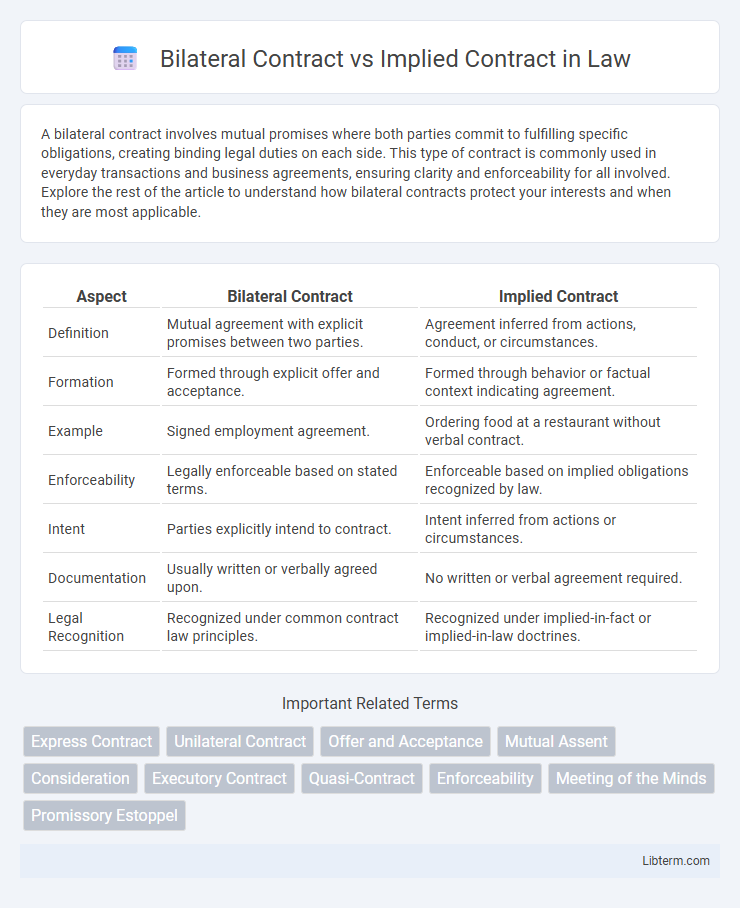A bilateral contract involves mutual promises where both parties commit to fulfilling specific obligations, creating binding legal duties on each side. This type of contract is commonly used in everyday transactions and business agreements, ensuring clarity and enforceability for all involved. Explore the rest of the article to understand how bilateral contracts protect your interests and when they are most applicable.
Table of Comparison
| Aspect | Bilateral Contract | Implied Contract |
|---|---|---|
| Definition | Mutual agreement with explicit promises between two parties. | Agreement inferred from actions, conduct, or circumstances. |
| Formation | Formed through explicit offer and acceptance. | Formed through behavior or factual context indicating agreement. |
| Example | Signed employment agreement. | Ordering food at a restaurant without verbal contract. |
| Enforceability | Legally enforceable based on stated terms. | Enforceable based on implied obligations recognized by law. |
| Intent | Parties explicitly intend to contract. | Intent inferred from actions or circumstances. |
| Documentation | Usually written or verbally agreed upon. | No written or verbal agreement required. |
| Legal Recognition | Recognized under common contract law principles. | Recognized under implied-in-fact or implied-in-law doctrines. |
Understanding Bilateral Contracts
Bilateral contracts involve mutual promises where each party commits to fulfilling their obligations, establishing clear terms through explicit agreement. These contracts are characterized by the exchange of consideration, such as goods, services, or payment, making them enforceable in a court of law. Understanding bilateral contracts is essential as they form the foundation of most business agreements, contrasting with implied contracts that rely on actions and circumstances rather than explicit promises.
What Is an Implied Contract?
An implied contract is a legally binding agreement formed by the actions, conduct, or circumstances of the parties involved, rather than through explicit written or spoken words. Unlike a bilateral contract, which involves mutual promises directly exchanged between parties, an implied contract arises when the behavior of one party reasonably indicates an acceptance of the terms proposed by the other. Courts enforce implied contracts to uphold fairness when one party benefits from the services or goods provided under circumstances suggesting consent.
Key Features of Bilateral Contracts
Bilateral contracts involve a mutual exchange of promises where both parties commit to perform specific obligations, creating enforceable legal duties. Key features include a clear offer and acceptance, mutual consent, and the intent to create legal relations, distinguishing them from implied contracts which arise from conduct or circumstances. The bilateral agreement establishes explicit terms that define each party's responsibilities, ensuring clarity and predictability in contractual relationships.
Core Elements of Implied Contracts
Implied contracts are formed through the conduct of the parties rather than explicit words, involving mutual agreement and consideration demonstrated by actions. The core elements of implied contracts include an offer inferred from behavior, acceptance indicated by performance, and consideration evident from the exchange of services or benefits. Unlike bilateral contracts, which explicitly state terms and promises from both parties, implied contracts rely on circumstantial evidence to establish obligations.
Differences Between Bilateral and Implied Contracts
Bilateral contracts involve explicit mutual promises between two parties, where each party commits to perform an obligation in exchange for the other's promise, creating a clear and enforceable agreement. Implied contracts, on the other hand, are formed through the conduct or circumstances of the parties, rather than written or spoken words, establishing obligations based on inferred intent. The key difference lies in the express nature of bilateral contracts versus the inferred consent and duties in implied contracts.
Legal Enforceability: Bilateral vs Implied Contracts
Bilateral contracts involve explicit mutual promises between parties, making them legally enforceable once both parties agree to the terms. Implied contracts derive from the conduct or circumstances of the parties, establishing an obligation without written or spoken words, and their enforceability depends on proving the intent and agreement through behavior. Courts enforce bilateral contracts based on the parties' expressed promises, while implied contracts require evidence demonstrating the parties' tacit understanding.
Real-World Examples of Bilateral Contracts
Bilateral contracts involve mutual promises between two parties, such as employment agreements where an employer agrees to pay salary in exchange for work performed by an employee. Real-world examples include purchase agreements for real estate, where the buyer promises to pay a specific amount and the seller promises to transfer ownership. Implied contracts, on the other hand, are formed through the actions or conduct of parties rather than explicit written or spoken terms, like when a patient visits a doctor expecting treatment and agrees to pay through their conduct.
Practical Examples of Implied Contracts
Implied contracts arise from the conduct or circumstances indicating an agreement, such as when a patient receives emergency medical treatment without explicitly consenting but is expected to pay. In a restaurant setting, ordering and consuming food without a verbal agreement creates an implied contract to pay for the meal. These examples contrast with bilateral contracts, where both parties exchange explicit promises, like signing a lease agreement.
Advantages and Disadvantages: Bilateral vs Implied Contracts
Bilateral contracts offer clear mutual obligations between parties, ensuring enforceability and reducing ambiguity, but they require explicit agreement, which can slow down transactions and increase negotiation complexity. Implied contracts, derived from actions or circumstances, allow for flexibility and efficiency in business dealings, especially when formal agreements are absent, yet they pose risks of misunderstandings and challenges in proving contract terms in disputes. Choosing between bilateral and implied contracts depends on the need for certainty versus adaptability in contractual relationships.
Choosing the Right Contract Type for Your Needs
Choosing the right contract type depends on the clarity and formality of the agreement. Bilateral contracts explicitly state mutual promises between parties, providing clear terms and enforceability ideal for detailed transactions. Implied contracts rely on actions or circumstances to infer agreement, suiting situations where formal written agreements are impractical but mutual intent is evident.
Bilateral Contract Infographic

 libterm.com
libterm.com